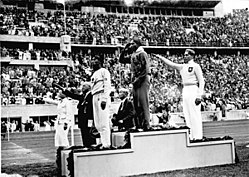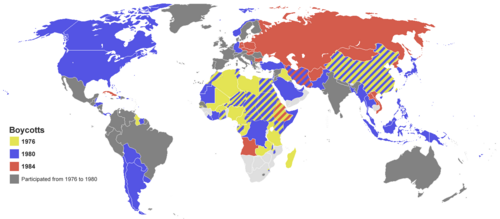| Olympic Games |
|---|
 |
| Main topics |
| Games |
| Regional games |
| Sub-regional games |
|
| Defunct games |
The Olympic Games is a major international multi-sport event. During its history, both the Summer and Winter Games have been the subject of scandals, controversies and incidents.
Contents
- Summer Olympics
- 1896 Summer Olympics – Athens, Greece
- 1900 Summer Olympics – Paris, France
- 1904 Summer Olympics – St. Louis, Missouri, United States
- 1906 Intercalated Games – Athens, Greece
- 1908 Summer Olympics – London, England, United Kingdom
- 1912 Summer Olympics – Stockholm, Sweden
- 1916 Summer Olympics (not held due to World War I)
- 1920 Summer Olympics – Antwerp, Belgium
- 1924 Summer Olympics – Paris, France
- 1928 Summer Olympics – Amsterdam, Netherlands
- 1932 Summer Olympics – Los Angeles, California, United States
- 1936 Summer Olympics – Berlin, Germany
- 1940 and 1944 Summer Olympics (not held due to World War II)
- 1948 Summer Olympics – London, England, United Kingdom
- 1952 Summer Olympics – Helsinki, Finland
- 1956 Summer Olympics – Melbourne, Australia and Stockholm, Sweden
- 1960 Summer Olympics – Rome, Italy
- 1964 Summer Olympics – Tokyo, Japan
- 1968 Summer Olympics – Mexico City, Mexico
- 1972 Summer Olympics – Munich, West Germany
- 1976 Summer Olympics – Montreal, Canada
- 1980 Summer Olympics – Moscow, Soviet Union
- 1984 Summer Olympics – Los Angeles, California, United States
- 1988 Summer Olympics – Seoul, Republic of Korea
- 1992 Summer Olympics – Barcelona, Catalonia, Spain
- 1996 Summer Olympics – Atlanta, Georgia, USA
- 2000 Summer Olympics – Sydney, Australia
- 2004 Summer Olympics – Athens, Greece
- 2008 Summer Olympics – Beijing, China
- 2012 Summer Olympics – London, England, United Kingdom
- 2016 Summer Olympics – Rio de Janeiro, Brazil
- 2020 Summer Olympics – Tokyo, Japan
- 2024 Summer Olympics – Paris, France
- Winter Olympics
- 1924 Winter Olympics – Chamonix, France
- 1928 Winter Olympics – St Moritz, Switzerland
- 1932 Winter Olympics – Lake Placid, New York, United States
- 1936 Winter Olympics – Garmisch-Partenkirchen, Germany
- 1940 and 1944 Winter Olympics (not held due to World War II)
- 1948 Winter Olympics – St. Moritz, Switzerland
- 1952 Winter Olympics – Oslo, Norway
- 1956 Winter Olympics – Cortina d'Ampezzo, Italy
- 1960 Winter Olympics – Squaw Valley, California, United States
- 1964 Winter Olympics – Innsbruck, Austria
- 1968 Winter Olympics – Grenoble, France
- 1972 Winter Olympics – Sapporo, Japan
- 1976 Winter Olympics – Innsbruck, Austria
- 1980 Winter Olympics – Lake Placid, New York, United States
- 1984 Winter Olympics – Sarajevo, Yugoslavia
- 1988 Winter Olympics – Calgary, Canada
- 1992 Winter Olympics – Tignes-Albertville, France
- 1994 Winter Olympics – Lillehammer, Norway
- 1998 Winter Olympics – Nagano, Japan
- 2002 Winter Olympics – Salt Lake City, Utah, United States
- 2006 Winter Olympics – Turin, Italy
- 2010 Winter Olympics – Vancouver, Canada
- 2014 Winter Olympics – Sochi, Russia
- 2018 Winter Olympics – PyeongChang, Republic of Korea
- 2022 Winter Olympics – Beijing, China
- See also
- References
- External links
Cheating, such as the use of performance enhancing drugs by athletes, has regularly affected the Olympic Games. Some countries have boycotted the Games on various occasions, either as a protest against the International Olympic Committee or the contemporary politics of other participants. Some countries have also been banned from the Olympics, such as the defeated countries after both World Wars or South Africa under apartheid. Other controversies have included decisions by referees and gestures by athletes.



